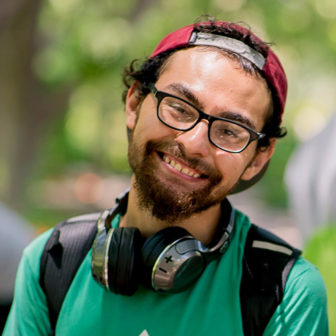
Emma manners/Shutterstock
.
As a young person who was in foster care as a teenager, I have come to realize that there are many misconceptions and stigmas surrounding young people in the foster care system. When teenagers first enter foster care, they are often in the midst of the most traumatizing time of their lives. Most teens who live with their families are able to have typical teenage experiences without many responsibilities or real-life worries.
For teens in foster care, day-to-day life is dramatically different. Foster youth experience severe trauma while simultaneously trying to adjust to their new environment. Often, how young people express their trauma is misinterpreted, and as a result, they are labeled “poorly behaved,” “problematic” or having anger issues. These labels indicate a lack of understanding of what young people in foster care go through, creating an inaccurate picture of young people impacted by the system.

Andrew Salazar
This stigma affects young people and minimizes the number of foster homes willing to take in teenagers, ultimately impacting their chances of being adopted. It also deters people from wanting to become foster parents at all. Misjudgments can have a lifelong effect on young people. Most young people entering foster care are just coming to the realization that the very people charged with protecting and supporting them have failed at doing so.
The pain of dealing with such trauma is often exhibited as negative behaviors. These behaviors are an outward expression of young people’s efforts to cope with feelings of being abandoned, given up on and characterized as criminal, problematic or dangerous. Despite past and current trauma, young people are perceptive of stigma and prejudice, which have an effect on their psychological health and development throughout their lives.
‘Lost cause’
For a long time, I myself believed what adults both involved in and outside the child welfare system thought of me. I remember overhearing a social worker referring to me while speaking with a foster parent as a “lost cause.” Not only did I feel as though my biological mother gave up on me, but now the entire system had as well.
That was not the last time I heard those words during my time in care. It took many years for me to shake the preconceived notions that followed me for most of my life. I was able to persevere thanks to adults who showed an interest in me and continuously told me that I was not only able to survive, but could thrive doing anything I set my mind to.
Having someone to believe in you as a young person is crucial. After aging out of the foster care system, I spent nearly a decade advocating for youth. It was during this time that I was finally able to overcome people’s negative perceptions and show myself that I wasn’t just a “lost cause.”
I had the support and encouragement of the executive director of a foster youth advocacy organization I am part of, called NMCAN. He gave me the push I needed to leave the world of youth advocacy and pursue employment in the political arena, where I have worked for the last three years.
Finally, I didn’t feel like a lost cause. Last summer, I was given an opportunity to intern for U.S. Rep. Deb Haaland, who represents New Mexico’s 1st District, in Washington, D.C. She was one of the first Native American women in Congress, elected in 2018.
My selection as her intern validated that I wasn’t just what people had labeled me all those years because she believed that I would be a valuable member of her team. I wouldn’t have had the courage to go to D.C. if it wasn’t for people like the executive director of NMCAN and Congresswoman Haaland. They not only believed that I could succeed but gave me a chance despite the false narrative that often characterizes youth in foster care.
We need to shift the narrative and eliminate the negative stigma of teens in foster care. Youth end up feeling like everyone has already given up on them and it needs to stop. Youth need to be authentically engaged in every decision while in care, and details involving their case need to be made transparent. This negative stigma has lifelong effects.
Young people’s trauma must be understood and they should have people to guide them and truly help them prepare for adulthood rather than just saying that teens are difficult. Teens in foster care need to stop being seen like criminals because it wasn’t their actions that got them placed in foster care.
Andrew Salazar is a Mexican American from Albuquerque, N.M., and spent seven years in foster care, aging out in 2014. As a foster youth advocate for six years, Andrew has been involved with several foster youth advocacy organizations, including NMCAN in New Mexico and the Annie E. Casey Foundation.





























